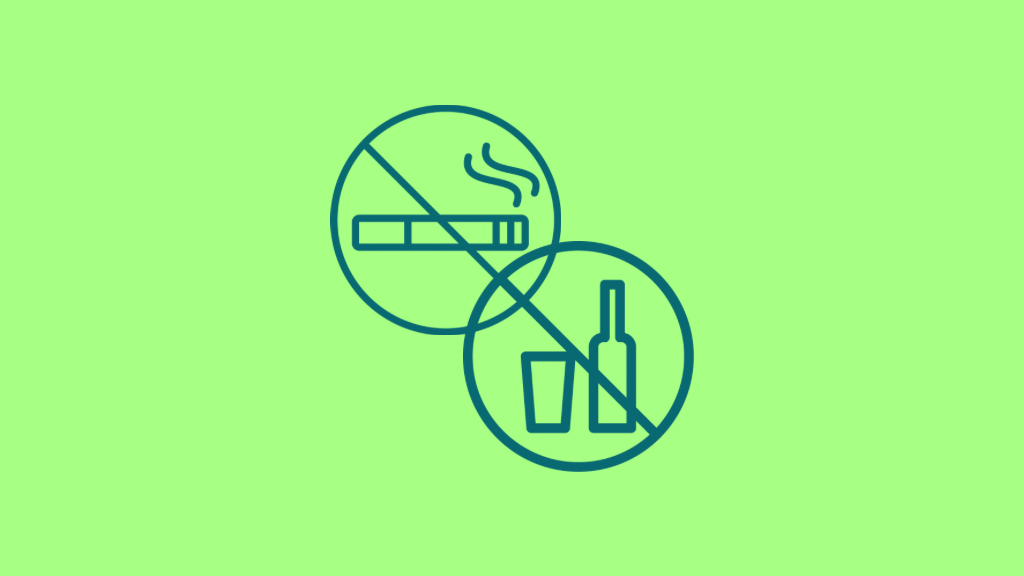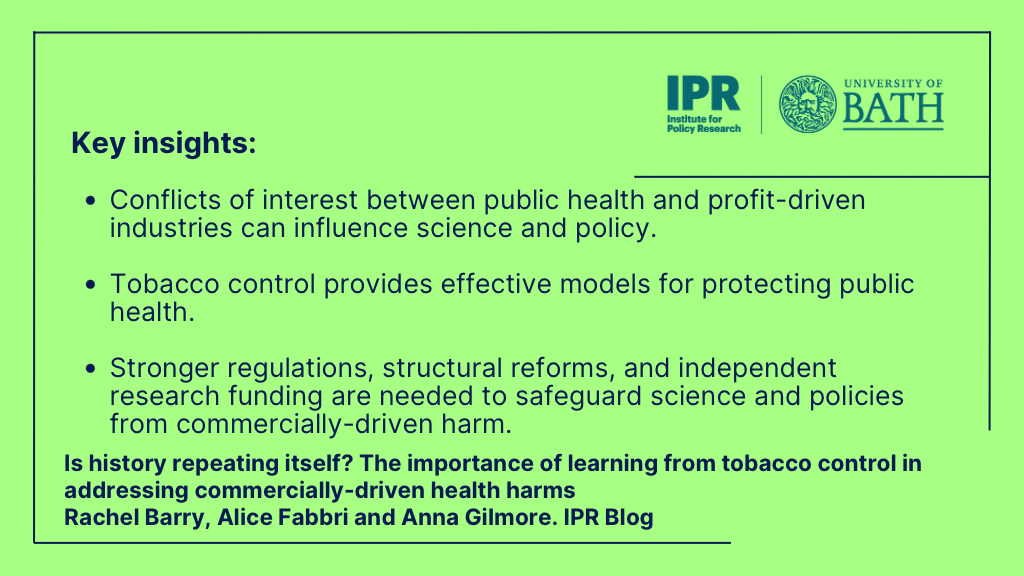Tobacco control offers critical lessons for protecting public health from harmful industry influence. This blog explores how conflicts of interest exist also in other areas of public health (e.g. alcohol) and can distort science and policymaking. Drawing on tobacco industry tactics, Rachel Barry, Alice Fabbri and Anna Gilmore argue for stronger regulations, structural reforms, and independent research funding to safeguard science and policies from commercially-driven harm.
Rachel Barry is a research fellow within the Centre for 21st Century Public Health at the University of Bath. With a political science background, her work focuses on the regulation and political influence of diverse health-harming industries, namely tobacco, alcohol, gambling and cannabis. Alice Fabbri is a Lecturer at the University of Bath. She is a public health physician and her work focuses on conflicts of interest and commercial influences on health. Anna Gilmore is Professor of Public Health, Director of the Tobacco Control Research Group and Co-Director Centre for 21st Century Public Health at the University of Bath. She is a public health physician, and She is a global leader in research on the commercial determinants of health, particularly in relation to the tobacco industry.
Over the last few decades, significant progress has been made in addressing the harms associated with tobacco use and the tobacco industry. Understanding and addressing the inherent conflict between the tobacco industry’s goal to maximise profits and the public interest played a key role in this process. Similar conflicts of interest (COIs) exist in other areas of public health (e.g. alcohol, ultra-processed foods, and gambling). In a paper recently published in the Future Healthcare Journal (FHJ), we explore insights gained from the successes and failures of tobacco control relevant for other fields and emphasise the importance of recognising and addressing COIs, especially in two areas: science and policymaking.
Industry influence on science: learning from the past
The release of internal documents from the tobacco industry as part of legal settlements exposed many of the strategies the industry used to manipulate science: from sponsoring favourable research that raised doubts about the harms of their products to the suppression of unfavourable research.
Attempts were made to address some of these problems: for example, some universities refuse to accept tobacco industry funding, some professional societies exclude the tobacco industry from their conferences, and some scientific journals do not publish tobacco industry-funded studies.
However, history is repeating itself as the tobacco industry has now resumed the problematic scientific practices it used in the past and is circumventing some of these measures put in place. For example, by channelling funding via third parties it makes it hard for journals to enforce their ban on publishing tobacco industry-funded research. Moreover, increasing evidence shows that other industry sectors engage in similar scientific strategies with the same goals. This is deeply concerning and requires urgent action.
Protecting policy from undue industry influence: learning from tobacco
Other areas of public health are repeating the mistakes historically made in tobacco control by placing trust in voluntary industry codes of conduct and industry-sponsored “youth prevention” programmes —despite overwhelming evidence that these strategies are ineffective, highly misleading, and primarily designed to delay and block regulation. In sectors like alcohol and gambling, voluntary codes remain common even though they consistently fail to protect children and young people from widespread exposure to harmful marketing. Unlike legally-binding regulations, these voluntary codes often permit advertising in media where youth audiences exceed their proportion in the general population, highlighting the serious limitations of industry self-regulation.
As the World Health Organization (WHO) warned back in 2001 in its report Fatal Deception: the tobacco industry’s “new” world standards for tobacco marketing:
Industry-inspired voluntary marketing restrictions create the appearance of concern and responsibility, but only include measures known to be ineffective. Their overarching aim is to protect the tobacco business. The agreements are formulated without regard to established research on youth smoking and without any intention to evaluate the results.
Similarly, internal industry documents reveal that so-called “youth smoking prevention” programmes were never genuinely intended to reduce smoking. Instead, their true purpose was to showcase the industry as socially responsible and willing to work with policymakers on addressing youth smoking. Meanwhile, they subtly promote tobacco use by framing it as an adult choice, making it more attractive and appealing to adolescents. Alcohol and gambling industry-funded youth prevention programmes have also been found to be ineffective and counterproductive as they construct a similar “forbidden fruit” message favourable to corporate interests.
Indeed, these tactics are far from relics of the past. Today, we see them replicated across industries, including alcohol, ultra-processed food, gambling, fossil fuels, and cannabis, among others. Yet, despite significant evidence of the similarities across corporate practices, there remains widespread failure to acknowledge and address the fundamental conflict of interest between the profit motives of health-harming industries and the goals of public health. As a result, governments continue to partner with such industries to address key challenges, like youth use, harmful consumption, and environmental degradation, that are largely driven by the industries themselves and despite clear evidence that partnership approaches, where there is a conflict of interest, are ineffective.
Conclusion and ways forward
One clear way forward is to learn from tobacco control and take meaningful steps to protect science and policy from industry influence. This means introducing strong, legally-binding regulations that prevent corporations – and the organisations they fund – from sitting on scientific and policy advisory committees or writing their own “rules” that undermine public health. On the policy front, a milestone has been the inclusion of Article 5.3 in the WHO Framework Convention on Tobacco Control. This article is legally binding and requires governments to protect public health policies by keeping the tobacco industry out of the policymaking process. Article 5.3 has been crucial for advancing tobacco control and is now urgently needed also in other areas.
At the same time, structural reforms are needed to safeguard scientific integrity and ensure science operates in the public interest; one promising solution is the creation of an independently administered research fund, financed through industry taxation. Similar models are already in place in California and Thailand.
Finally, another significant example comes from Canada that has recently adopted national regulations requiring tobacco companies to reimburse the government for expenses related to its tobacco control strategy. This measure applies the "polluter pays" principle, with companies contributing based on their market share.
If we are serious about putting human and planetary health above profit, we must stop allowing harmful industries to shape the science and policies meant to regulate them.
This paper is part of a series published in Future Healthcare Journal – Why addressing conflicts of interest is essential to progress in reducing commercially driven health harms: Lessons from tobacco
All articles posted on this blog give the views of the author(s), and not the position of the IPR, nor of the University of Bath.
Respond





